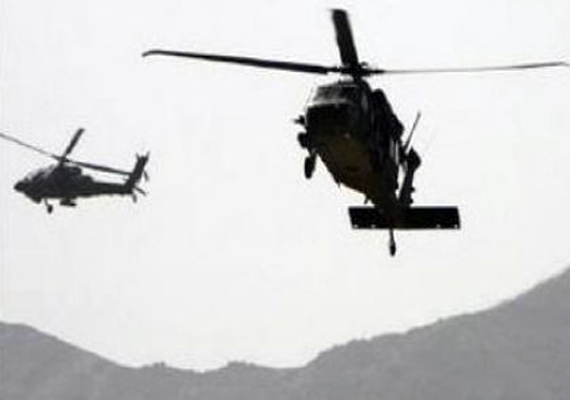Islamabad, Nov 26: At least 28 Pakistani soldiers were killed today when NATO helicopters and combat jets fired on two border posts in the country's northwest, prompting army chief Gen Ashfaq Parvez Kayani to direct his troops to prepare for “an effective response” even as authorities cut off all supplies for US forces in Afghanistan.
The attack, the worst single incident of its kind in one decade, looked set to plunge US-Pak relations, already deeply frayed, further into crisis.
A major and a captain of the Pakistan Army were among those killed when NATO aircraft fired at the borders posts in Baizai area of Mohmand tribal region at 2 am. Fifteen more personnel were wounded and the death toll could rise as some of the injured were in a serious condition, several officials said.
A military statement said the NATO aircraft “carried out unprovoked firing” on the border posts. Pakistani troops “effectively responded immediately in self-defence to NATO/ISAF's aggression with all available weapons”.
Gen Kayani strongly condemned “NATO/ISAF's blatant and unacceptable act”.
While lauding the effective response by Pakistani soldiers, he issued orders for taking all necessary steps for “an effective response to this irresponsible act”.
Within hours of the attack, Pakistani authorities sealed off the country's border stopping all container trucks and tankers carrying supplies for US and NATO forces in Afghanistan.
Foreign Secretary Salman Bashir called in US Ambassador Cameron Munter to lodge a “strong protest on the unprovoked NATO/ISAF attack”, the Foreign Office said in a statement.
Bashir told the US envoy that the attack had “deeply incensed the government and the people of Pakistan”.
The President, Prime Minister and the government “strongly condemn the attacks which were totally unacceptable, constituted a grave infringement of Pakistan's sovereignty, were violative of international law and a serious transgression of the oft conveyed red lines”, the statement said.
The incident could have “serious repercussions on Pakistan-US/NATO/ISAF cooperation”, the statement further said.
Prime Minister Yousuf Raza Gilani described the incident as an “attack on Pakistan's security and sovereignty” and cut short a visit to his hometown of Multan to rush back to Islamabad.
He convened a meeting of the Defence Committee of the Cabinet to formulate Pakistan's response to the incident. Khyber-Pakhtunkhwa Governor Masood Kausar, while talking to media in Islamabad, put the death toll at 26. However, other officials were quoted by the media as saying that 28 soldiers were killed.
The attack comes at a time when US-Pak relations have plunged to a new low since early this year over the Raymond Davis episode and the unilateral raid by US that killed al-Qaeda chief Osama bin Laden in Abbottabad on May 2. US Ambassador Munter expressed regret at today's incident and offered assistance in probing it.
In a statement issued by the US Embassy, Munter said: “I regret the loss of life of any Pakistani servicemen, and pledge that the United States will work closely with Pakistan to investigate this incident”.
A spokesman for the NATO-led ISAF in Kabul said the coalition was aware of “an incident” near the border and was gathering information on it.
Security forces blocked all entry points to Mohmand Agency after the incident and began checking all vehicles. Several crossings on the Afghanistan frontier, including Landikotal and Takhtbai, were closed and over 150 NATO supply vehicles were turned back to Peshawar. The Pakistan Embassy in the US lodged a verbal protest over the attack.
The Deputy Chief of Mission Iffat Gardezi contacted the US State Department at midnight and described the incident as “unprovoked”.
Pakistan's Ambassador to the European Union, Jalil Abbas Jilani, lodged a similar protest with NATO.
Former premier Nawaz Sharif, the chief of the PML-N, condemned the incident and described it as an “act of terrorism” while Pakistan Tehrik-e-Insaf chief Imran Khan called on the government to pull out of the US-led war on terrorism.
The incident occurred just a day after Gen Kayani and the commander of coalition forces in Afghanistan, Gen John Allen, met in Islamabad and discussed the need for tighter measures to block the movement of militants across the Pak-Afghan border.
In May, two Pakistani soldiers were injured in an exchange of fire with two NATO helicopters from Afghanistan that intruded into the volatile North Waziristan tribal region.
Pakistan had retaliated against yet another incursion by NATO helicopters in September last year, which killed two Pakistani soldiers, by shutting down the main supply route for NATO forces.
The route was reopened after the US tendered an official apology for the incursion.
Prior to today's attack, the deadliest attack on Pakistani soldiers involving NATO occurred in June 2008, when 11 soldiers were killed in an air strike in Mohmand Agency.

